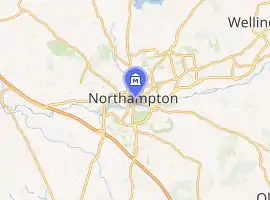Northampton Museum and Art Gallery
Northampton Museum and Art Gallery is a public museum in Northampton, England. The museum is owned and run by Northampton Borough Council and claims to house the largest collection of shoes in the world, with over 12,000 pairs.[1]
 The main entrance to Northampton Museum | |

| |
| Established | 1884 |
|---|---|
| Location | Guildhall Road, Northampton, England |
| Coordinates | 52.2366°N 0.8946°W |
| Website | www |
The town's museum was established in 1865, but moved to the current site in 1884, where it shared its space with the town's library. After the library moved in 1910, the museum took over the whole building.[2] In 2012, the museum was refurbished for better access.[1] The museum closed in February 2017 to allow work to start on a major expansion project; the new museum is expected to re-open in early 2020.[3]
Exhibits

The museum has been collecting footwear since the 1870s and now boasts the largest collection of shoes in the world, which was designated as being of international importance by the Museums, Libraries and Archives Council in 1997.[4] The ground floor is given over to the display of some of the museum's 12,000 pairs of shoes, spanning the period from the Ancient Egyptians to the present day.[5] There are also two galleries dedicated to footwear: Life & Sole focuses on the history of shoemaking and contains a re-creation of an old shoe factory; Followers of Fashion concentrates on the history of fashions in footwear throughout the centuries.[6] Some of the paintings on display reflect the museum's focus on footwear, such as the 17th-19th century Dutch and Flemish works by Jan Miel and Hendrik van Oort featuring cobblers, shoemakers and shoeshiners.[7] As long-time Keeper of the Boot and Shoe Collection, curator June Swann played a significant role in its development. She began in 1950, and worked there for 38 years.[8]
The second and third floors of the museum house exhibits about Northampton's history and displays of Oriental ceramics and Italian art from the 15th to the 18th century.[6]
Sekhemka statue controversy
The museum conducted a controversial sale of an Ancient Egyptian statue of Sekhemka in July 2014, with questions relating to the ownership and the ethics of selling the statue being raised by various organizations. The statue was sold to an unknown buyer for £15.76m, which broke the existing world record for Ancient Egyptian artwork at auction. On 1 August 2014, Northampton Museums had its accreditation removed by the Arts Council England, which ruled that the sale broke the required standards for how museums manage their collections; loss of accreditation includes ineligibility for a range of arts grants and funding, and is in effect until at the earliest, August 2019.[9]
See also
References
- "Northampton's world famous shoe museum reopens after refurbishment", BBC News, Northampton, 14 April 2012.
- "Celebrating 150 years of Northampton Museums & Art Gallery", Northampton Borogh Council, 27 July 2015.
- "Work to upgrade controversial museum gets underway", ITV News, 21 February 2017.
- "Northampton Museum and Art Gallery to put shoe archive online", BBC News, Northampton, 8 March 2014.
- Museums and galleries, Northampton Borough Council, retrieved 15 December 2012
- Northampton Museum and Art Gallery, Culture24, retrieved 15 December 2012
- Paintings at Northampton Museum & Art Gallery, Northampton Borough Council, BBC, archived from the original on 24 September 2015, retrieved 15 December 2012
- Weideger, Paula (24 August 1992). "You are what you wear on your feet: For June Swann, a boot is a clue to personality as well as social history. Paula Weideger talked to her". The Independent. Archived from the original on 2 February 2015. Retrieved 2 February 2015.CS1 maint: bot: original URL status unknown (link) ()
- "Sekhemka statue: Northampton Museum loses Art Council accreditation". BBC News. 1 August 2014. Retrieved 14 March 2015.
